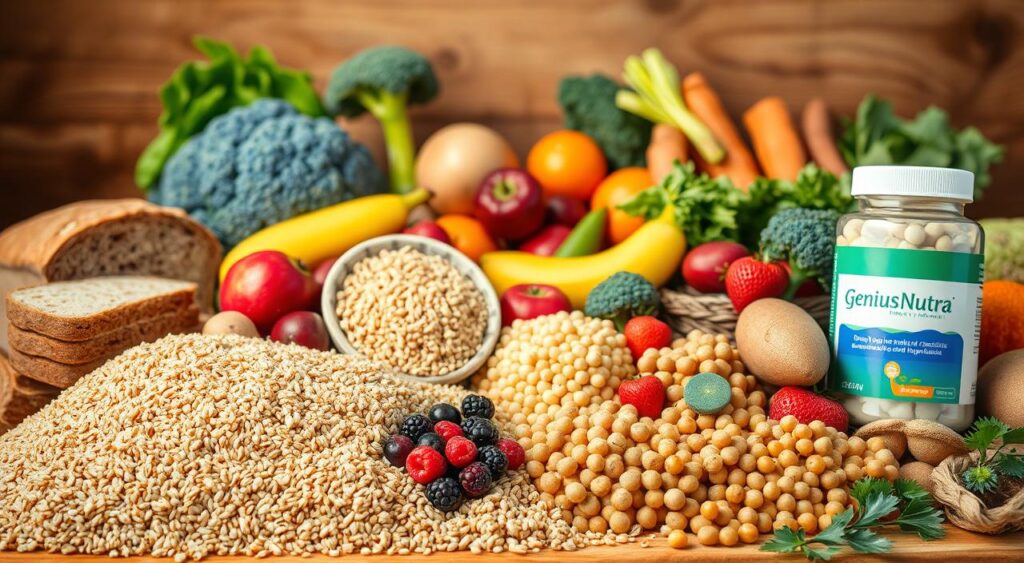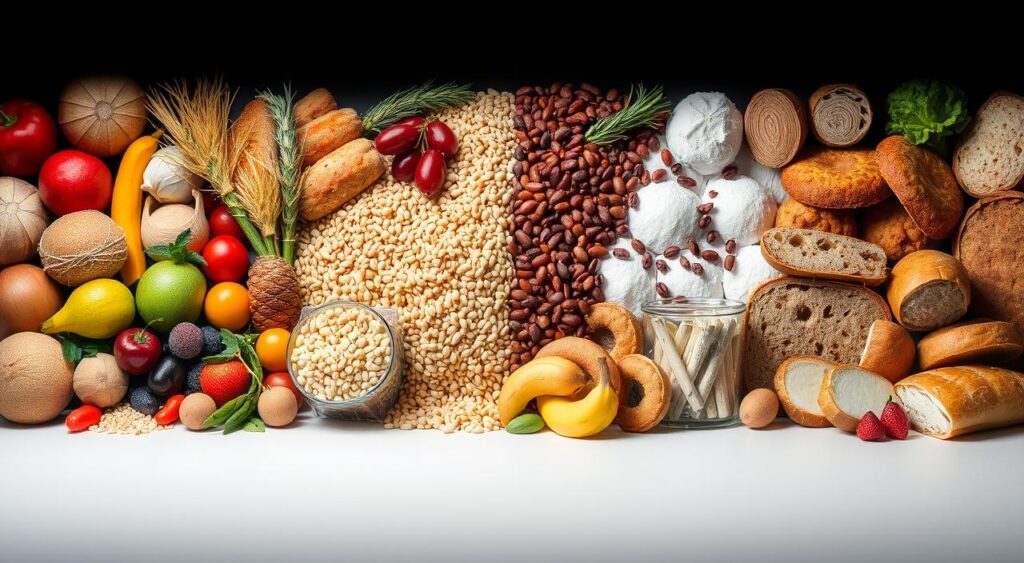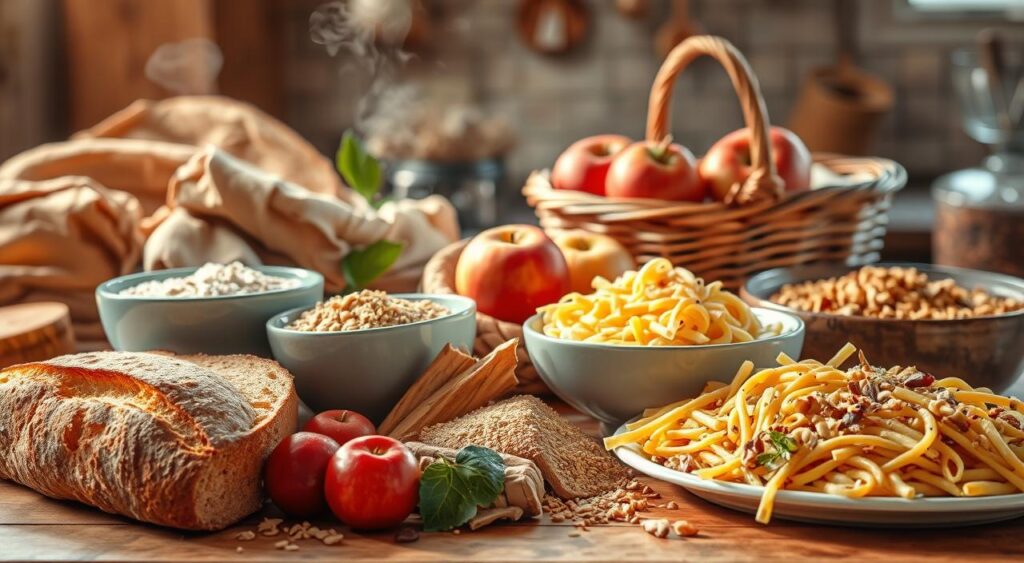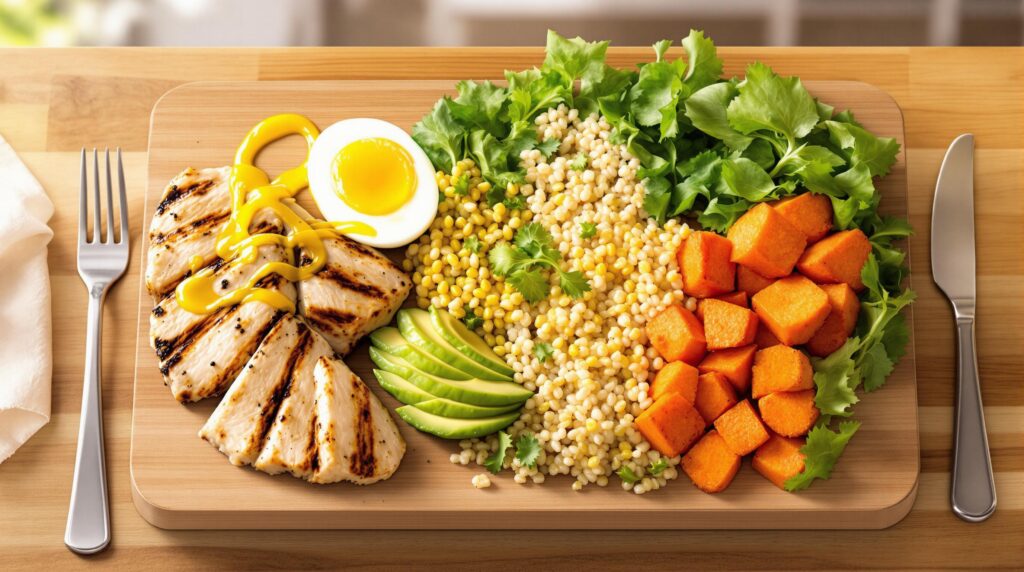Carbohydrates get a bad rap, making many think they cause weight gain and health problems. But, the right carbs are key to giving your body energy and nutrients. We’ll look at the best carbs, how to balance them for energy, and what to skip for better health.
Understanding Carbohydrates and Their Role in Energy
Carbohydrates are key to your daily diet, acting as your body’s main energy source. They come in three types: sugars, starches, and fibers. Simple carbs, found in fruits and sweets, give quick energy. On the other hand, complex carbs in whole grains and legumes provide energy that lasts longer.
Your diet’s nutrient mix affects your energy and health. Eating a variety of carbs ensures you get the energy you need and other important nutrients. Mixing simple and complex carbs helps keep your energy stable, supporting an active life and good health.
Types of Carbohydrates: Simple vs Complex
Knowing the different types of carbohydrates is key to making smart food choices. Carbohydrates are a main energy source for our bodies. They can be split into simple and complex carbs, each with its own role in how we feel and our health.
Simple Carbohydrates Explained
Simple carbs have just one or two sugar units, making them easy to digest. You find them in fruits, honey, and many processed foods. They give quick energy but can cause blood sugar to rise and fall fast. This can mess with your energy all day.
Understanding Complex Carbohydrates
Complex carbs are longer chains of sugar units that digest slower. You find them in whole grains, legumes, and veggies. They give steady energy and keep you feeling full. They also have fiber, which helps with digestion and health. Choosing complex carbs helps keep your energy stable.
Benefits of Carbohydrate-Rich Foods
Carbohydrate-rich foods are great for your health. They give you the energy you need for physical activity and thinking clearly. Foods high in fiber, like whole grains, help keep you full and support weight control.
They also prevent you from eating too much. Each type of carb, from grains to fruits, adds important vitamins and minerals to your diet.
Fueling Your Body for Optimal Energy
Your body uses glucose from carbs to work well. This energy is key for daily tasks and doing your best. Eating a variety of healthy carbs boosts your energy levels.
Some top picks include:
- Whole grains like quinoa, brown rice, and oats
- Legumes such as beans and lentils
- Fruits and vegetables full of nutrients
Improving Brain Function with Carbs
Carbs do more than just fuel your body. They also help your brain work better. The brain needs constant energy to stay sharp, and carbs provide that.
Eating complex carbs keeps your mind clear and focused. Foods like fruits, whole grains, and beans are good for your brain. For more on how diet affects energy, check out this resource.
What to Eat: Best Sources of Carbohydrates
Adding healthy carbs to your diet boosts your health and energy. Whole grains, fruits, and vegetables are great. They give you nutrients and energy that lasts.
Whole Grains as Healthy Carb Options
Whole grains are top picks for healthy carbs. Oats, quinoa, and brown rice are full of vitamins and minerals. They also have lots of fiber, which helps with digestion.
Eating them regularly can lower cholesterol and blood sugar. Plus, they give you energy that lasts.
Fruits: Natural Energy Sources
Fruits like bananas, apples, and berries give your body a natural energy boost. They’re full of natural sugars that turn into energy fast. Fruits also have antioxidants that are good for your health.
For tasty ways to eat fruits, check out some delicious breakfast ideas that include them.
Vegetables for Sustained Energy
Vegetables, like leafy greens and roots, are key for energy. They have complex carbs that give energy without the crash. Plus, they’re low in calories but packed with nutrients.

Carbohydrate-Rich Foods: What to Include in Your Diet
Adding foods high in carbs to your diet can boost energy and health. Quinoa and oats are great choices because of their nutritional benefits.
Quinoa: A Complete Protein Source
Quinoa is a top pick for carbs. It’s not just full of carbs but also has all the amino acids your body needs. This makes it perfect for muscle repair and keeping energy up. Its nutty taste and soft texture make it great in salads, bowls, or as a side.
Try adding quinoa to your meals for more nutrients and feeling full.
Oats: Heart-Healthy Choices
Oats are also a smart carb choice. They’re good for your heart because of their soluble fiber, like beta-glucan. This fiber can lower cholesterol and keep blood sugar steady.
You can have oats as oatmeal, in smoothies, or in baked goods. They offer a warm, nutritious base for many meals. Eating oats regularly helps keep your energy up all day.
High-Carb Foods: The Good, The Bad, and The Ugly
Not all high-carb foods are the same. It’s key to know the difference between good carbs and bad carbs. Good carbs, found in whole foods, give us nutrients and energy. Bad carbs, in processed foods, can harm our health over time.
Identifying Good Carbs vs. Bad Carbs
Good carbs are in fruits, veggies, legumes, and whole grains. They’re full of vitamins, minerals, and fiber. These help keep our energy up and our health good. Bad carbs, like white bread and sugary cereals, lack nutrients and can raise blood sugar too fast. This can make us hungry and gain weight.
Understanding Refined Carbohydrates
Refined carbs are processed, losing their natural nutrients and fiber. They don’t fill us up and can lead to eating too much. Eating them can harm our health, raising the risk of obesity and diabetes.
| Type of Carbohydrate | Examples | Nutritional Benefits | Health Implications |
|---|---|---|---|
| Good Carbs | Whole grains, fruits, vegetables, beans | High in fiber, vitamins, minerals | Help regulate blood sugar, promote fullness |
| Bad Carbs | White bread, sugary snacks, pastries | Low in nutrients, high in added sugars | Can lead to weight gain and health problems |
| Refined Carbohydrates | White rice, pasta, processed cereals | Poor source of nutrients, lacking fiber | Increased hunger, possible metabolic issues |
Knowing the difference between good carbs, bad carbs, and refined carbs helps us make better food choices. This way, we can take care of our health better.

What to Avoid: High-Carb Foods to Limit
To keep your energy up and stay healthy, it’s smart to cut down on certain high-carb foods. Foods that are processed often have a lot of sugar and not much good stuff. This can make your energy go up and down fast. Here are some foods you should try to avoid.
Processed Foods That Can Sap Your Energy
Processed foods usually don’t have much good in them and have bad stuff added. Eating these can make you feel tired. Here are some examples:
- Instant noodles
- Pre-packaged meals
- Snacks like chips and crackers
- Certain frozen dinners
The Risks of Sugary Snacks and Beverages
Sugary snacks and drinks are also high-carb foods to watch out for. They give you empty calories, which can lead to weight gain and health problems. Here are some common ones:
- Candy bars
- Soda and sugary drinks
- Pastries and desserts
- Ice cream and desserts high in sugar
Fueling with Carbs: Meal Planning Tips
Good meal planning is key to keeping your energy up all day. Mixing healthy carbs with proteins and fats makes meals that last. It’s about making smart choices for meals that are both filling and healthy.
Combining Carbs with Proteins and Healthy Fats
Mixing different nutrients is good for your health. Try these combos:
- Oats with almond butter
- Quinoa, grilled chicken, and avocado
- Sweet potatoes, black beans, and olive oil
These meals give you energy from carbs and add to their nutritional value.
Portion Control for Balanced Energy
Controlling your portions is vital. It affects your energy and health. Here’s how to do it right:
- Use a food scale or measuring cups for portions.
- Pay attention to when you’re hungry to eat just enough.
- Use the plate method: half veggies, a quarter carbs, a quarter protein.
These tips help you eat balanced meals. They prevent energy drops and keep you focused all day.

Using Carbohydrates to Manage Your Weight
Adding carbohydrates to your diet can really help with weight management. Including fiber-rich foods and whole grains is key. They support your body and keep hunger away.
How Fiber-Rich Foods Keep You Full
Foods high in fiber make you feel full, which helps with weight control. Fruits, veggies, nuts, and seeds are great choices. They fill you up without adding too many calories.
This feeling of fullness helps you eat less between meals. It stops you from snacking too much.
Importance of Whole Grains in Weight Management
Whole grains are vital for managing weight. They give you important nutrients without too many calories. Brown rice, quinoa, and whole wheat bread are good choices.
These foods give you lasting energy. They also help you get enough fiber in your diet.
| Food Type | Benefits | Examples |
|---|---|---|
| Fiber-Rich Foods | Promotes satiety, aids digestion | Fruits, Vegetables, Legumes |
| Whole Grains | Provides nutrients, maintains energy | Quinoa, Brown Rice, Whole Wheat Bread |
| Mixed Meals | Combines benefits of both | Whole grain salads, Fiber-rich smoothies |
Monitoring Your Carbohydrate Intake
It’s key to keep track of how much carbs you eat for good health. Everyone’s needs are different, based on age, how active you are, and health goals. On average, an adult needs 225 to 325 grams of carbs a day, depending on their diet.
Daily Carbohydrate Needs for Optimal Health
Knowing how many carbs you need helps you make better food choices. This way, you can pick the right carbs for your meals. It keeps your energy up and makes sure you get all the nutrients you need.
Watching your carb intake can lead to better health. It’s also helpful for managing diabetes.
Reading Nutrition Labels for Carbohydrates
Learning to read nutrition labels is important for managing carbs. Look for serving size and total carbs. This helps you pick the right carbs and understand how they affect your intake.
Nutrition labels are great tools for reaching your diet goals. You can also use resources like the USDA’s Food Composition Database to track carbs. For more tips on carb management, check out carb counting resources.
Advantages of Fiber-Rich Carbohydrate Sources
Eating foods high in fiber can greatly benefit your health. These foods are key for good nutrition and help fight off diseases. They support your digestive health and help keep you healthy.
Protecting Against Disease with Fiber
Foods rich in fiber help keep your cholesterol and blood sugar levels in check. Oats, legumes, and whole grains are great for this. Eating them can reduce your risk of heart disease and diabetes.
Improving Digestive Health with Fiber
Fiber is important for a healthy digestive system. It helps you go to the bathroom regularly and prevents constipation. Beans, fruits, and veggies are all good for your gut and help you absorb nutrients better. Try to eat these foods often for better digestion.
How Lifestyle Affects Energy from Carbohydrates
Your lifestyle choices greatly impact how well your body uses carbs for energy. By focusing on hydration and exercise, you can boost your energy levels. This makes you feel more alive and active all day long.
The Role of Hydration in Energy Levels
Drinking enough water is key to keeping your energy up. Even a little dehydration can make you feel tired. Water helps your body digest and use carbs for energy.
Make sure to drink plenty of fluids all day. This helps keep your energy levels high.
Exercise: Boosting Metabolism and Energy
Regular exercise is good for your health and boosts your metabolism. It helps your body use carbs better, making more energy. A mix of cardio and strength training is best.

Common Myths About Carbohydrates
Understanding carbs can be tough, with many myths out there. These myths can lead to bad food choices and fear. It’s key to clear up some of these myths, like those about weight gain and low-carb diets.
The Truth About Carbs and Weight Gain
Many think all carbs make you gain weight. But this isn’t true. Studies show not all carbs are the same. Foods like whole grains, fruits, and veggies are good for you and don’t make you gain weight.
Also, eating fiber-rich carbs can make you feel full. This helps you eat less and avoid gaining weight.
Dismantling the Low-Carb Diet Myth
Low-carb diets are often praised for quick weight loss. But they’re not for everyone. A balanced diet with healthy carbs gives you energy and keeps you healthy.
Going low-carb can make you miss out on nutrients. It might also make daily activities harder.
| Myth | Reality |
|---|---|
| All carbs cause weight gain | Healthy carbs can support weight management |
| Low-carb diets are best for everyone | Balanced carb intake is beneficial for health |
| Carbs make you feel sluggish | Whole grains and fruits provide energy |
Creating a Balanced Diet with Carbohydrate-Rich Foods
Building a balanced diet with carbs is key for good health. Mixing different carbs makes meals tasty and full of nutrients. This mix helps keep your energy up and supports your overall health.
Incorporating a Variety of Carb Sources
To make a balanced diet, add many carb sources to your meals. Here are some good ones:
- Whole grains like brown rice, quinoa, and barley
- Fruits such as bananas, berries, and apples
- Vegetables, like sweet potatoes, spinach, and carrots
These carbs give you important vitamins and minerals. They boost your health and energy.
Building Your Meals Around Nutrient-Dense Carbs
Focus on carbs that are full of nutrients for better energy and satisfaction. Here’s how to plan your meals:
- Start with whole grains as your base.
- Add colorful veggies for extra nutrients.
- Include a fruit for natural sweetness.
- Add protein like beans, nuts, or lean meats to complete your meal.
Each part of your meal is important for a balanced diet. It ensures you get all the nutrients from carbs. Eating nutrient-dense carbs keeps your energy up all day.
The Best Time to Consume Carbohydrates
Knowing when to eat carbs can boost your energy and performance. Eating carbs at the right time gives you the energy for workouts and a great start to the day. Let’s look at two key points: pre-workout carbs and breakfast carbs.
Timing Your Carb Intake Around Workouts
Eating carbs before working out is key for better performance. Carbs give your body energy, helping you work out harder and longer. Try to eat a carb-rich snack or meal 30 to 60 minutes before your workout.
Good options include a banana, whole-grain toast, or oatmeal. These foods give quick energy and prevent tiredness during your workout.
Carbs for Breakfast: Starting the Day Right
Carbs in breakfast are important for starting your day right. They help keep your blood sugar stable and give you energy all day. Choose whole grains like oatmeal or whole-grain bread, and add fruits.
These foods are full of nutrients and fiber. They make you feel full longer and give you the energy to face your day.
Conclusion
Understanding the role of carbs in your diet is key for good energy and health. Focus on whole grains, fruits, and veggies. These choices help manage your energy all day.
By cutting down on refined sugars and choosing nutrient-rich foods, you get lasting energy. This helps you tackle daily tasks with ease.
Creating a balanced diet means exploring the wide range of carbs out there. Knowing when to eat carbs can boost your energy and performance. It’s all about the right timing and choice.
By following these tips, you’ll manage your energy better and feel great. Making smart carb choices leads to a more vibrant, energetic life.



